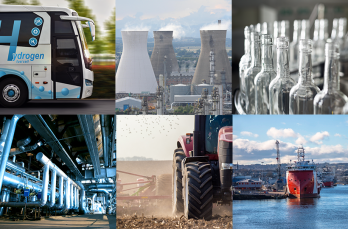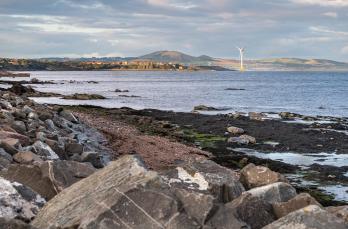Close collaboration between networks and government will keep Scotland at the forefront of decarbonising the energy system, says our Director of Energy Futures Gus McIntosh in this blog.
Scotland has ambitious targets for decarbonising the economy. With a net zero deadline of 2045 and a 2030 requirement to reduce emissions by 75% against 1990 levels, meeting these goals will require close co-operation between many organisations.
The Scottish Energy Networks Strategic Leadership Group (SLG) was set up in 2020 to work collaboratively on achieving Scotland’s energy and climate change ambitions.
With a “positive and cooperative approach,” the Group specialises in “identifying how we work together to deliver net zero across Scotland,” says its co-chair and my colleague on the Group, Paul Wheelhouse, the Scottish Government Minister for Energy, Connectivity and the Islands.
In the past year, the SLG has looked at how Scotland can lead on decarbonising the gas networks, identified innovation opportunities, and worked to advance the development of a whole system approach. The result of this work, a Whole System Charter committing to the principles of collaboration, innovation and data-driven decision-making, has been adopted by the networks to support the planning, development and operation of a future net zero energy system. This is a step forward that is vital in the development of a whole system approach that works for everyone, delivering customers’ wants and needs.
Another part of our work has been agreeing shared objectives and ambitions, resulting in the Group’s first set of principles. The principles set out a way of working between the networks, Government and regulators, recognising the importance of the Scottish Government’s policy targets and what needs to happen to achieve them.
As well as the wider net zero goals, those targets include an ambition for 5GW of hydrogen production capacity by 2030, and a 20% injection of green gas to our network by the same year. Scotland also has progressive fuel poverty targets that look to ensure a Just Transition to a greener future. These bring huge opportunities for Scotland to continue leading the way in decarbonising the energy system.
With hydrogen set to play a crucial role in Scotland’s net zero future, the principles will also underpin our decision-making as we continue to decarbonise heating, industry and transport around this versatile energy vector. Projects like H100 Fife, our world-first green hydrogen-to-homes network powered by clean offshore wind, and North-East Network and Industrial Cluster, which is building a roadmap for Scottish industry to go net zero, will benefit from the new clarity on what constitutes good evidence, and their recognition of the importance of strategic planning for industrial decarbonisation.
We’re pleased to sign up to these new principles, and we look forward to working together to deliver a net zero energy system with hydrogen as its backbone - creating a greener, more prosperous future for Scotland and the rest of the UK.




